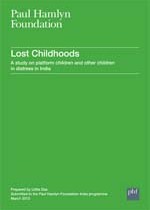Future strategy ideas
The future strategy ideas for PHF primarily focus on the long term and sustainable changes that can be made in the lives of children in distress. Our research has pointed at the lack of information on repatriation and a detailed study of its impact. We may conclude that there exists limited information on what happens to children at shelters/homes or what happens to them after the age of 18. It is our belief that children in conflict with the law are erstwhile children in need for care and protection and that there is an urgent need to restore children’s dignity. Based on the study of approaches and strategies of NGOs working with runaway children and an analysis of the primary issues concerning children in distress the following suggestions for PHF’s future strategy have been made:
- At the micro level, PHF’s continued support to NGOs working with children in distress will be most meaningful through direct implementation of the programme among children in distress.
- Training modules at After Care Homes to deal with the baggage of trauma and fear using creative arts, drawing and theatre to work with
the inner systems of the children in distress. - Using music and theatre as a recreational facility at children’s homes for community building and personal development. The programme could focus on children-at-risk and urban youth through creating participative music education programs and life-skills.
- Training modules at After Care Homes to deal with the baggage of trauma and fear using creative arts, drawing and theatre to work with
- At the meso level, PHF can look at supporting and taking forward some innovative and established NGOs that are running programmes which have been successfully franchised nationally and internationally with the aim to restore children’s dignity.
- NGOs that run successful vocational training programmes with street children trained by eminent institutions in the field, directly impacting the children who undergo trained and find a job.
- Fellowships could be given to street children who may want to study/ train further for a limited period of time.
- At the meta level, PHF may look at the option of supporting research with a focus on gaps in information areas on children in distress by sponsoring research in institutions of repute creating knowledge and information on children in distress.
- Areas of research: While attention has been given increasingly to children in distress some gaps persist. A long-term longitudinal study, monitoring the movement/ rehabilitation of runaway children is likely to help understand the actual impact of repatriation. Similarly, the way life unfolds for institutionalised children will also help us understand and compare the two primary approaches towards working with runaway children.
- Another area for research is to understand the extent of drug abuse among the street children and explore the link between juvenile crime and drug addiction. Sponsoring of research at academic institutions of repute could be explored further.
- Finally, PHF’s support can play a crucial role in policy advocacy at the macro level. This could be done through creating a network and/or successful partnerships with NGOs that work with children in distress and those NGOs that focus on advocacy.
Judiciary focussed advocacy could help in supporting campaign on runaway children with a focus on the role of Judiciary.
With these strategy ideas, PHF can contribute further towards a life of safety, dignity and care for children in distress, a sincere step towards helping them to realise their potential and enjoy a better quality of life, thereby restoring their lost childhood.
